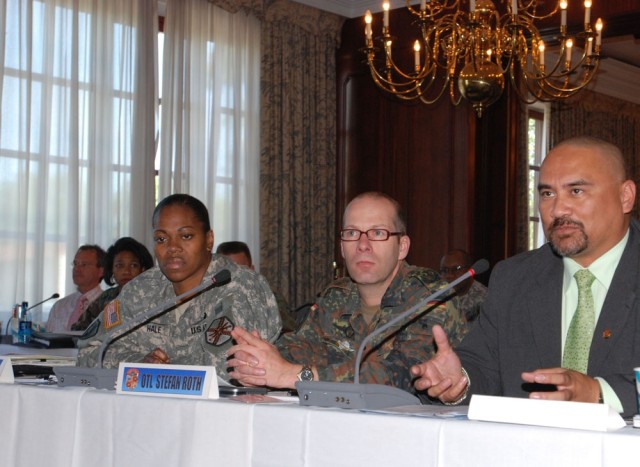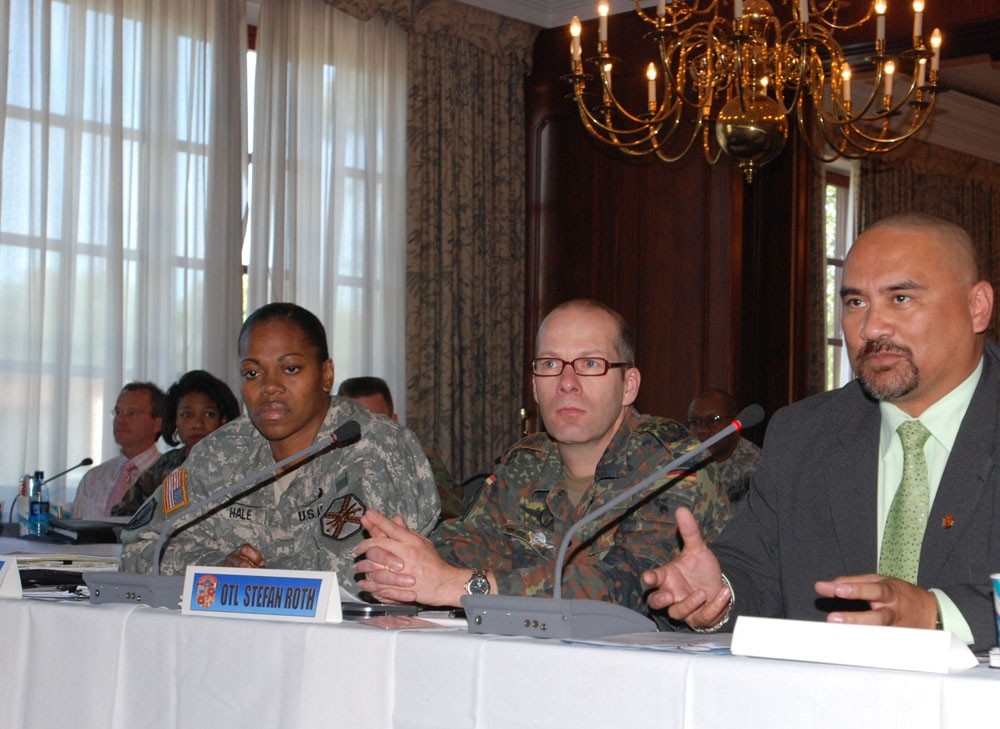
HEIDELBERG, Germany - The common perception of emergency response training or a command-post exercise involves Soldiers, firefighters and other first responders reacting to simulated disasters and mass casualty situations.
Guardian Shield 2007, a tabletop exercise held here Sept. 11-13, took the emergency responders to a higher level.
Using examples of mock terrorist attacks taking place on two garrisons located in Germany, Guardian Shield helped strategic, garrison-level and community leaders, action officers and planners better understand each other's missions, responsibilities and capabilities during an emergency.
The annual exercise was a consequence management drill meant to prepare the U.S. Army Europe staff and the command's subordinate units at the tactical and garrison levels for emergencies - such as a chemical spill, biological crisis, terrorist attack, major accident or other large-scale emergency - said Lt. Col. Robert Doyle, USAREUR operations section exercise staff.
"This exercise brings in all the participants that respond to an event," Doyle said. "We are not here for humanitarian assistance but we are working in response to mitigate the damages and effects of those types of incidents."
"It is a scenario-driven exercise where all of the agencies tell how they would respond," he said. "We walked through all the procedures to make sure everyone understands what needs to happen and how we would coordinate."
The exercise's estimated 120 participants included representatives from the U.S. State Department, European Command, USAREUR, U.S. Air Forces Europe, Installation Management Command-Europe, the Defense Threat Reduction Agency and representatives from German federal, state and local governments and emergency services.
"IMCOM is a big player in this event because it is the lead agency on the ground in dealing with the host nation," Doyle said. "The host nation is the lead (agency) for responding to an event."
The exercise's first day consisted of seminars presented by action officers working in garrison tactical/emergency action centers, Doyle said.
The second day saw decision makers - principal staff officers, commanders, police and fire chiefs - learning about each others' duties, assets and roles during an emergency.
The last day was filled by the tabletop exercise and lessons learned.
"We are looking for roadblocks, misunderstandings and gaps in the responses," Doyle said. "We want to respond efficiently in a crisis."
Those hiccups will be eliminated and the procedures developed during the exercise will be used to update procedures and emergency operations planning at all levels at USAREUR, the garrisons and neighboring host-nation communities, Doyle said.
"The biggest challenge of the military is that we always want to be in charge," he said. "But, in this case, we are in a supporting role. The host nation has (many) resources that can be used."
Many of the leaders, subject matter experts and emergency response team members attending Exercise Guardian Shield will participate in the U.S. European Command's Exercise Flexible Response 2008 in December, he said.
Garrison leaders attending the exercise demonstrated to the attendees that the U.S. and German communities were ready for emergencies because of the experience together, he said.
Lt. Col. Mechelle Hale, U.S. Army Garrison Kaiserslautern commander, brought a contingent of county and state officials with whom she and her Kaiserslautern team work and practice, Doyle said. "They gave us a warm feeling that if something happened they would be right there with our local neighbors helping out. There is a plan where everybody is working together."
"The good thing about this exercise is that you get to see what each player does from the tactical side to the strategic level," Hale said.
Talking though an incident and learning the communications process that takes place between agencies in the context of an incident scenario "is essential" for understanding how first-responders and leaders will fulfill their missions in an emergency, she said.
"This makes me feel comfortable that the leaders are integrated into the process and they are here to support the garrison commands."
The Kaiserslautern military community always had a strong relationship and emergency response team with its German and Air Force counterparts, said Henry Kaaihue, USAG Kaiserslautern force protection and consequence management section chief.
The community is planning hands-on emergency response exercises slated for later this fall, he said. "What we are learning here helps solidify what we are doing in the next few weeks."
(Dave Melancon is a member of the USAG Heidelberg Public Affairs Office)

Social Sharing